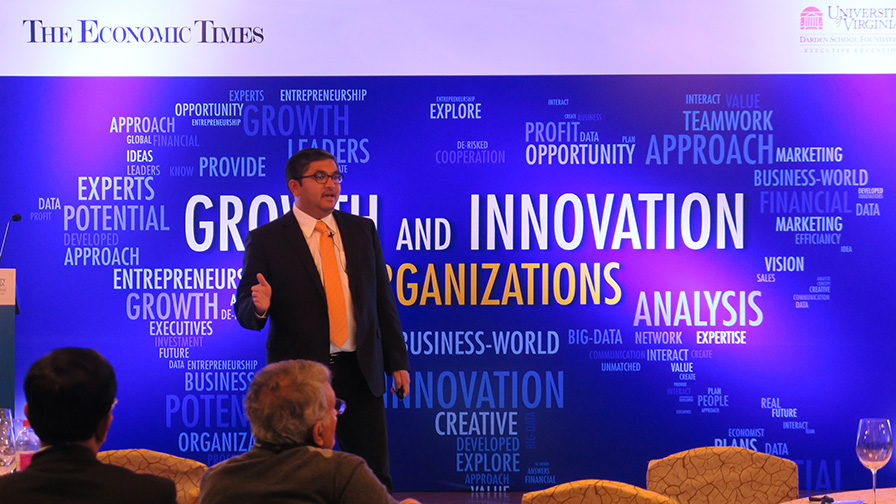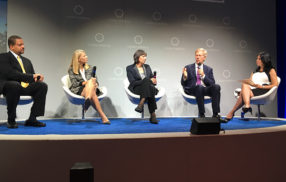
The Big Missed Opportunity With Big Data
By Dave Hendrick
When Professor Raj Venkatesan started teaching marketing analytics at the University of Virginia Darden School of Business more than a decade ago, he had to write his own cases in order to have sufficient course material to teach in the newly emerging field.
In the ensuing years, though, the scope and depth of the field of study boomed, as a seemingly endless trove of data derived from an increasingly connected consumer heightened the capability — and the stakes — of marketing analytics and the businesses it serves.
However, in this new data-rich landscape, Venkatesan noticed something else.
Data was everywhere, but most companies continued to operate as if it was business as usual. Game-changing capabilities took shape with predictive analytics, machine learning and artificial intelligence applications rapidly becoming reality, but companies simply weren’t taking advantage.
“There is a lot of data, but nobody’s using it,” Venkatesan said. “Companies are struggling to make use of the data environment.”
A recent McKinsey report affirms Venkatesan’s contentions. According to McKinsey in “The age of analytics: Competing in a data-driven world,” major sections of the U.S. economy are missing out, with manufacturing unlocking less than 30 percent of the value of Big Data and the health care sector under 20 percent. A relative outlier, retail has captured 30 to 40 percent of the possible value.
While marketers are comparatively more adept at using Big Data than other sectors, their efforts remain sporadic.
Untapped Opportunity
That Big Data represents an area of enormous opportunity is clear, and many companies are starting to make great use of troves of consumer data to great effect. For example, witness the proliferation of location-based functionality in scores of apps.
While it’s an oversimplification to paint the data-savvy, disruptive Silicon Valley startup against the stuck-in-its- ways incumbent, it’s also a story with clear examples. Uber is crushing taxis in part due to its ability to deliver a seamless user experience using elements of Big Data.
Netflix’s unique DVD-by-mail system may have attracted a critical mass of consumers away from Blockbuster, but it was an ability to tailor content derived from rigorously tracked consumer habits that made Netflix into a multibillion dollar company and drove Blockbuster out of existence.
Increasingly, the companies who know how to use and prioritize the importance of Big Data seem to be winning, Venkatesan says. It is a foregone conclusion that a better understanding and application of Big Data will be key to long-term success in a variety of industries. Why then, have so many been slow to take advantage of the space?
Venkatesan’s research seeks to identify organizational factors that enable an analytics orientation and uncover the processes adopted by firms that have harnessed the power of Big Data. For his most recent working research paper co-authored with Professor Kimberly Whitler, the professors interviewed senior business leaders around the world. The findings led to what Venkatesan and Whitler have termed “the five paradoxes of Big Data” — seeming contradictions with which even the most forward-looking, customer-centric companies that believe in the power of Big Data struggle.
The Five Paradoxes of Big Data
- Market Success, in which companies see little incentive to explore new territory during successful times. Companies that wish to stay on top must resist this complacency.
- Uncertain Outcomes, in which a disrupted market and new key performance metrics scare people away from using new data.
- Problem Complexity, in which large, complex problems are spread across groups, or silos, making it less likely that a common language of expertise exists. Rapid prototyping and developing may help solve this problem.
- Science but No Curation, which involves using data to help understand the past, present and future of a business. Analytics should be a form of curation, according to Venkatesan.
- Perfection Pursuit, in which the pursuit of an impossibly perfect outcome prevents companies from engaging in the sorts of rapid prototyping and iterative design that are essential to making use of Big Data.
Breaking Silos, Changing Mindsets
Key aspects of Venkatesan and Whitler’s research is reinforced by recent findings from The CMO Survey, a biannual survey of nearly 400 marketing executives conducted by the American Marketing Association, Deloitte and Duke University.
The survey found that less than a third of marketing leaders are using analytics before making a decision, and not due to a lack of analytics. Instead, the primary factor preventing executives from using data or analytics to inform decisions was a lack of process or measurement tools around the data, followed closely by a lack of personnel capable of bridging the gap between marketing analytics and marketing practice.
On the latter point, Venkatesan and Darden may have a solution to empower cross-functional data experts of the future. Darden recently partnered with UVA’s Data Science Institute to offer a unique dual-degree program, in which students will complete an MBA/Master of Science in Data Science (MBA/MSDS) over the course of two years.
Venkatesan, who serves as the faculty lead for the new program, envisions graduates of the program as precisely the sorts of transformative business leaders who will be able to work across silos and break through the paradoxes of Big Data.
“Transformation requires more than technology, as the technology is there,” said Venkatesan. “Instead, the values and mindsets around Big Data and analytics need to be changed.”
Five Companies Successfully Making Use of Big Data
The University of Virginia Darden School of Business prepares responsible global leaders through unparalleled transformational learning experiences. Darden’s graduate degree programs (MBA, MSBA and Ph.D.) and Executive Education & Lifelong Learning programs offered by the Darden School Foundation set the stage for a lifetime of career advancement and impact. Darden’s top-ranked faculty, renowned for teaching excellence, inspires and shapes modern business leadership worldwide through research, thought leadership and business publishing. Darden has Grounds in Charlottesville, Virginia, and the Washington, D.C., area and a global community that includes 18,000 alumni in 90 countries. Darden was established in 1955 at the University of Virginia, a top public university founded by Thomas Jefferson in 1819 in Charlottesville, Virginia.
Press Contact
Molly Mitchell
Senior Associate Director, Editorial and Media Relations
Darden School of Business
University of Virginia
MitchellM@darden.virginia.edu











